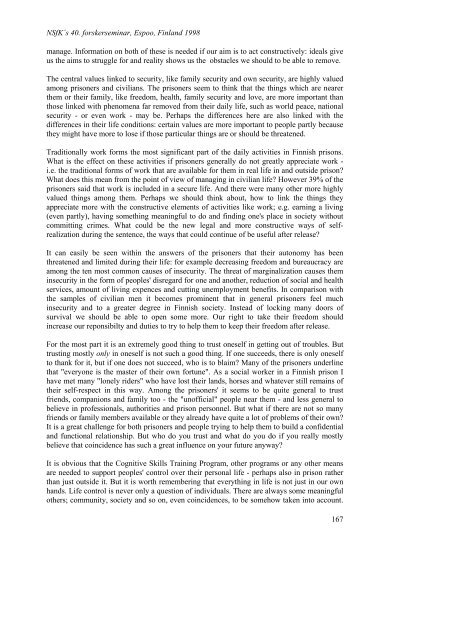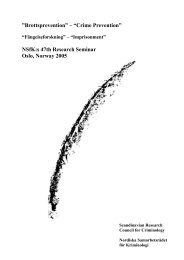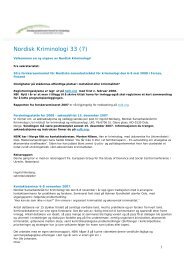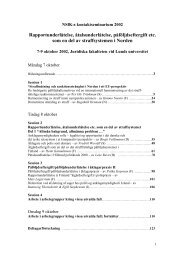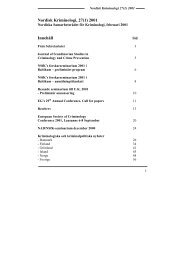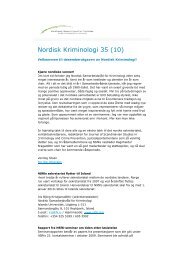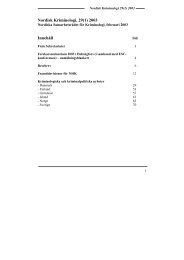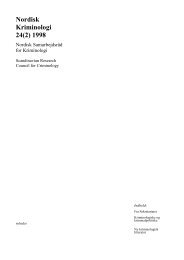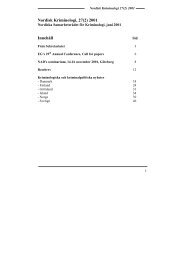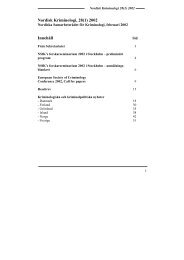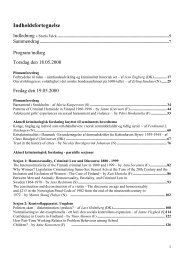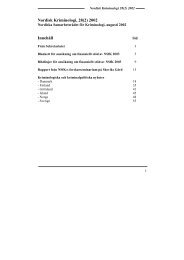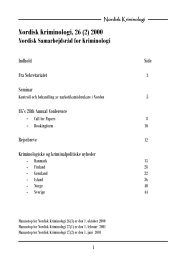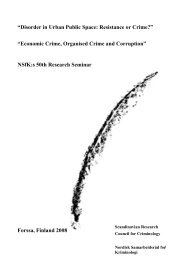Organised Crime & Crime Prevention - what works? - Scandinavian ...
Organised Crime & Crime Prevention - what works? - Scandinavian ...
Organised Crime & Crime Prevention - what works? - Scandinavian ...
You also want an ePaper? Increase the reach of your titles
YUMPU automatically turns print PDFs into web optimized ePapers that Google loves.
NSfK´s 40. forskerseminar, Espoo, Finland 1998<br />
manage. Information on both of these is needed if our aim is to act constructively: ideals give<br />
us the aims to struggle for and reality shows us the obstacles we should to be able to remove.<br />
The central values linked to security, like family security and own security, are highly valued<br />
among prisoners and civilians. The prisoners seem to think that the things which are nearer<br />
them or their family, like freedom, health, family security and love, are more important than<br />
those linked with phenomena far removed from their daily life, such as world peace, national<br />
security - or even work - may be. Perhaps the differences here are also linked with the<br />
differences in their life conditions: certain values are more important to people partly because<br />
they might have more to lose if those particular things are or should be threatened.<br />
Traditionally work forms the most significant part of the daily activities in Finnish prisons.<br />
What is the effect on these activities if prisoners generally do not greatly appreciate work -<br />
i.e. the traditional forms of work that are available for them in real life in and outside prison?<br />
What does this mean from the point of view of managing in civilian life? However 39% of the<br />
prisoners said that work is included in a secure life. And there were many other more highly<br />
valued things among them. Perhaps we should think about, how to link the things they<br />
appreciate more with the constructive elements of activities like work; e.g. earning a living<br />
(even partly), having something meaningful to do and finding one's place in society without<br />
committing crimes. What could be the new legal and more constructive ways of selfrealization<br />
during the sentence, the ways that could continue of be useful after release?<br />
It can easily be seen within the answers of the prisoners that their autonomy has been<br />
threatened and limited during their life: for example decreasing freedom and bureaucracy are<br />
among the ten most common causes of insecurity. The threat of marginalization causes them<br />
insecurity in the form of peoples' disregard for one and another, reduction of social and health<br />
services, amount of living expences and cutting unemployment benefits. In comparison with<br />
the samples of civilian men it becomes prominent that in general prisoners feel much<br />
insecurity and to a greater degree in Finnish society. Instead of locking many doors of<br />
survival we should be able to open some more. Our right to take their freedom should<br />
increase our reponsibilty and duties to try to help them to keep their freedom after release.<br />
For the most part it is an extremely good thing to trust oneself in getting out of troubles. But<br />
trusting mostly only in oneself is not such a good thing. If one succeeds, there is only oneself<br />
to thank for it, but if one does not succeed, who is to blaim? Many of the prisoners underline<br />
that "everyone is the master of their own fortune". As a social worker in a Finnish prison I<br />
have met many "lonely riders" who have lost their lands, horses and <strong>what</strong>ever still remains of<br />
their self-respect in this way. Among the prisoners' it seems to be quite general to trust<br />
friends, companions and family too - the "unofficial" people near them - and less general to<br />
believe in professionals, authorities and prison personnel. But <strong>what</strong> if there are not so many<br />
friends or family members available or they already have quite a lot of problems of their own?<br />
It is a great challenge for both prisoners and people trying to help them to build a confidential<br />
and functional relationship. But who do you trust and <strong>what</strong> do you do if you really mostly<br />
believe that coincidence has such a great influence on your future anyway?<br />
It is obvious that the Cognitive Skills Training Program, other programs or any other means<br />
are needed to support peoples' control over their personal life - perhaps also in prison rather<br />
than just outside it. But it is worth remembering that everything in life is not just in our own<br />
hands. Life control is never only a question of individuals. There are always some meaningful<br />
others; community, society and so on, even coincidences, to be somehow taken into account.<br />
167


